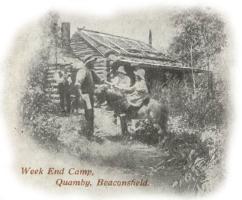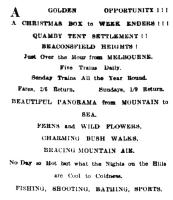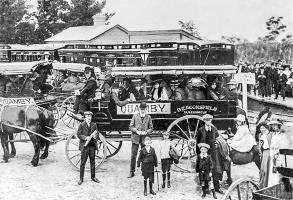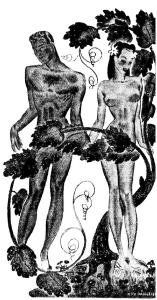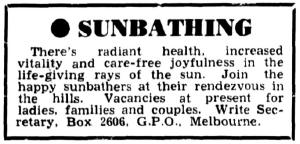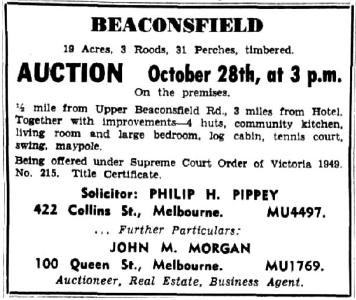Camping in the Beaconsfield Ranges
The old advertisements in the Guide to the Beaconsfield Ranges and newspapers all mentioned that the area offered great shooting and fishing. Some people would travel to Upper Beaconsfield and stay at the local hotels and guest houses, but this was not affordable to everyone.
Others, like a group of six lads from Melbourne camped about a mile from the Pine Grove Hotel, at a place called Mud Hut (believed to be in the Cardinia Reservoir area). They had come to Upper Beaconsfield for the Easter weekend in 1908, in order to go rabbit shooting. Unfortunately, their weekend turned out to be a tragic one, when they witnessed the death of a 15-year-old local boy William Gibbs, who accidentally shot himself when climbing through a fence with a loaded gun. The visitors had to give evidence at the inquest into William's death.
The Quamby tent settlement
In about 1906, Edmund Thomas Luke, Henry Maxwell Browne and George Wilson Martin bought a thirty-acre property in Guys Hill from Marion Jane Smith, Dr. L. L. Smith's wife. They established the "Quamby Tent Tourist Association" and erected a rotunda on the property, "for the benefit of visitors, who are invited to rendezvous on 'Quamby' without fee". They also had plans to improve a fern gully and other natural features on the property. By the end of 1907 they had subdivided the property into countless lots of varying shapes and sizes. What the exact number was is not clear, as not every 'site' got a title certificate. They even had a plan to establish a state school on the settlement, though there is no evidence that it went further than a public meeting.
The blocks of land, touted to be ideal for weekend residences, were released in small numbers, as an advertisement in The Age in December 1908 suggests. The original offer was for blocks costing £15 to £25. In this second offer, blocks were available for ten pounds each. "Quamby is a popular and established settlement, select in character, possessing exceptional natural advantages as a delightful spot to rest and recuperate from the labour and worries of city life."
The Victorian Tourist Bureau in 1910 wrote: "A new mountain resort has recently sprung into existence. Numbers of small, but comfortable, houses have been built by towns people as week-end dwellings, and there is a constant stream of holiday traffic to 'Quamby,' as the settlement is called. A splendid rustic rotunda and room, replete with all the requisites for picnickers, has been erected, and tanks ensure a supply of fresh drinking water. Sunday visitors are invited to make use of 'Quamby' and the rotunda, where the facilities afforded make families quite independent of hotels."
The establishment of this settlement explains why Boss Shorthouse had a Quamby sign attached to the side of his carriages.
The houses in the settlement were probably more shacks than houses. In June 1916, a resident, Mrs Cadell, reported that she had been staying at the settlement at the house of Mrs Latham, and that on return there in April she noticed that the canvas at the back of the house had been removed and that some items were missing. Two sisters, one of them a resident of Beaconsfield, were charged with the crime. The Bench sentenced each of the accused to a month's imprisonment. With the sentence the local magistrate wanted to set an example 'that it was necessary that weekend residences should be protected.'
By 1925 only a handful of owners paid their rates regularly, most were in arrears, and it can be assumed that they had abandoned their sites.
An aerial photograph of 1939 shows a vegetated area, not heavily cleared, but there is little evidence of any buildings.
In the late 1940s the Quamby settlement was re-subdivided.
The Nudist Colony
A different type of camping existed in our humble community between 1937 and 1960. Stories about its existence abound, but real evidence, naturally, is hard to come by. After all, its location was kept secret from anyone but its members. The property, two 10-acre allotments along what is now High Street, Guys Hill, was managed by the 'Victorian Health and Sunbathing League'. Ownership of the property changed over the years, and it can be assumed that the people who are listed on the title certificate and in the Shire rate books were members of the club.
The first advertisement appeared in December 1937, and many similar ads followed over the years. The most thorough description of the club and its aims can be found in an article in the Sydney paper Smith's Weekly in December 1940. Membership was estimated as being between 40 and 50. The league was open to families, couples and unmarried women, but bachelors were barred. Members were known to each other by their first names only, though the club's committee knew the members' full details. 'Undue familiarity' was frowned upon, and could lead to expulsion from the club. Alcohol was not allowed, and ladies and gentlemen had to 'conduct themselves as such at all times'.
The property had four huts (refer to ad) and converted tramcars with bedding. There was a tennis court, swings, see-saws, and a maypole. The property was very well timbered, so that privacy was guaranteed.
Local stories about the colony abound. Here are a few:
While some visitors to the colony came by car, others caught the bus which dropped them off at the top of High Street. A nearby neighbour said that some of the visitors did not wait to reach the confines of the colony to take off their clothes.
One woman recalls a windy day when she went for a walk down High Street as a child. The canvas surrounding the tennis court flapped in the wind, revealing the nude players, which were plainly visible through the bushes. They were not concerned about passers by.
Upon enquiry, a local bachelor 'confessed' that he broke his arm the previous night while having a closer look at the colony. He had he climbed a tree to get a better view, but fell when he got 'a bit distracted'.
In 1946 a married couple took over ownership of two fifths of the property, which may have lead to a disagreement among the owners. In 1949 the Supreme Court ordered the property to be auctioned. While the court case was not reported on in the papers, the forced auctioning of the property prompted the press to disclose: 'Nudist secret meeting place sold at weekend'.
I have not found any further advertisements for the club after the sale, but the club may have been renamed to avoid scrutiny.
The summer of 1960 was long and dry, and a bushfire at the end of March destroyed three of the cottages at the colony. It was said that the loss of the cover of the bush was lamented much more than the loss of the cabins. After the fire the colony was abandoned, but the land was not sold until the 1980s.
First published in the Village Bell Issue 212 (June 2018)
